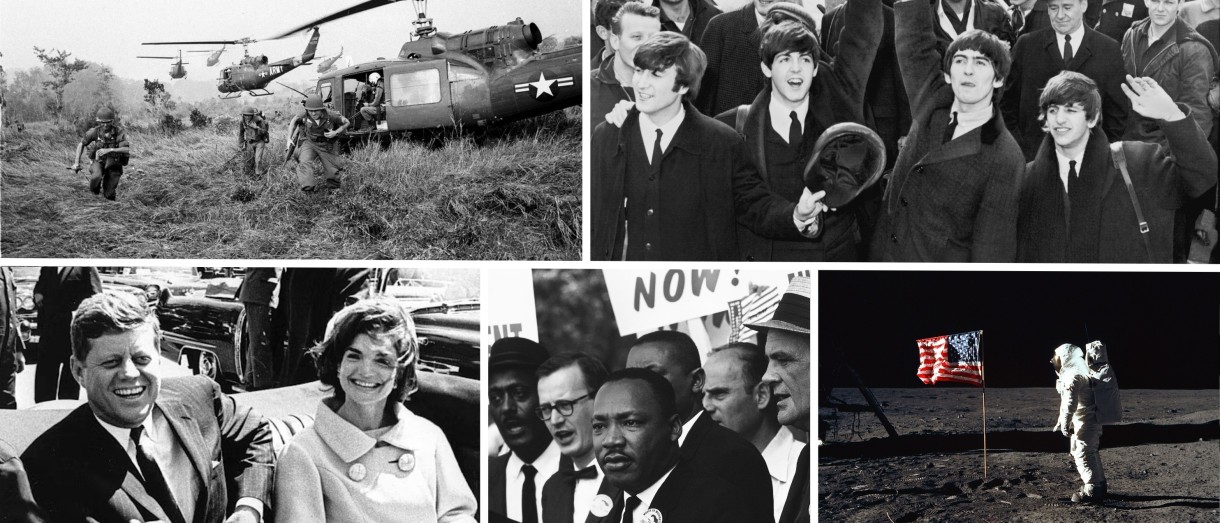
America in the 1960s

-
Campus Programs
- Institute for Honor Symposium: Business as a Force for Good
- Tom Wolfe Weekend Seminar: Vigil
- Summer College I: The Founding of an Independent Nation at 250
- Summer College III: Family Adventure in Theater: Puppetry & Performance
- Summer College II: From Stone to Smartphone: “Books” and the Materiality of Reading
- Law and Literature Weekend: The Round House by Louise Erdrich
- Accommodations and Dining
- Additional Program Information
- Past Programs
- Travel Programs
- Online Programs
America in the 1960s
July 2 - 7, 2023
 “It was the best of times, it was the worst of times.” So it might have been said about the 1960s in the United States. It was a decade of rejuvenation and aspiration, of new energy given to the nation’s ideals: civil rights, the eradication of poverty, environmental conservation, technological advances and the reach for the moon. But it was also a decade marred by assassination, violent protest and civil disorders, a new war that threatened and ultimately destroyed the lives of tens of thousands of young Americans, a powerful anti-war movement that challenged concepts of patriotism, and an irrepressible social revolution that rocked many of the nation’s traditional values.
“It was the best of times, it was the worst of times.” So it might have been said about the 1960s in the United States. It was a decade of rejuvenation and aspiration, of new energy given to the nation’s ideals: civil rights, the eradication of poverty, environmental conservation, technological advances and the reach for the moon. But it was also a decade marred by assassination, violent protest and civil disorders, a new war that threatened and ultimately destroyed the lives of tens of thousands of young Americans, a powerful anti-war movement that challenged concepts of patriotism, and an irrepressible social revolution that rocked many of the nation’s traditional values.
The decade began with the election of a young president eager to lead the nation to new frontiers. But an assassin’s bullet shattered “Camelot” on a November morning in 1963. Kennedy’s death gave new urgency to the Great Society Programs of his successor, and with that the promise of equal rights and opportunities for all citizens, Congress expanded housing and medical care, guaranteed civil and voting rights, transformed the nation’s immigration system, and enacted employment and educational reform. And yet the War in Vietnam ground on, raising new questions about America’s role in the world and the obligations of citizens to support the war effort. These questions ultimately produced a political backlash that set the liberal agenda of the Great Society against a conservative new Moral Majority. And then, on July 20, 1969, we set foot on the moon.
The 1960s also inspired a remarkable cultural flourishing of music and art, of theater and film. It was the decade of Woodstock and “Hair,” of folk music and the Beatles, of counterculture and “Mary Poppins,” of Andy Warhol and Leonard Bernstein, and the widespread popularity of television. Reflecting on who we were and who we would become, we’ll examine how the 1960s came to be called the pivotal decade of the 20th century. W&L faculty include Molly Michelmore, professor of history; Brian Alexander, assistant professor of politics, Scott Williamson, visiting assistant professor of music; and Elliott King, associate professor of art history; along with special guest speakers. Come together.
-
Campus Programs
- Institute for Honor Symposium: Business as a Force for Good
- Tom Wolfe Weekend Seminar: Vigil
- Summer College I: The Founding of an Independent Nation at 250
- Summer College III: Family Adventure in Theater: Puppetry & Performance
- Summer College II: From Stone to Smartphone: “Books” and the Materiality of Reading
- Law and Literature Weekend: The Round House by Louise Erdrich
- Accommodations and Dining
- Additional Program Information
- Past Programs
- Travel Programs
- W&L at Home
Lifelong Learning
- P: 540-458-8723
- E: lifelong@wlu.edu
-
Lifelong Learning
Washington and Lee University
204 W Washington Street
Lexington, VA 24450